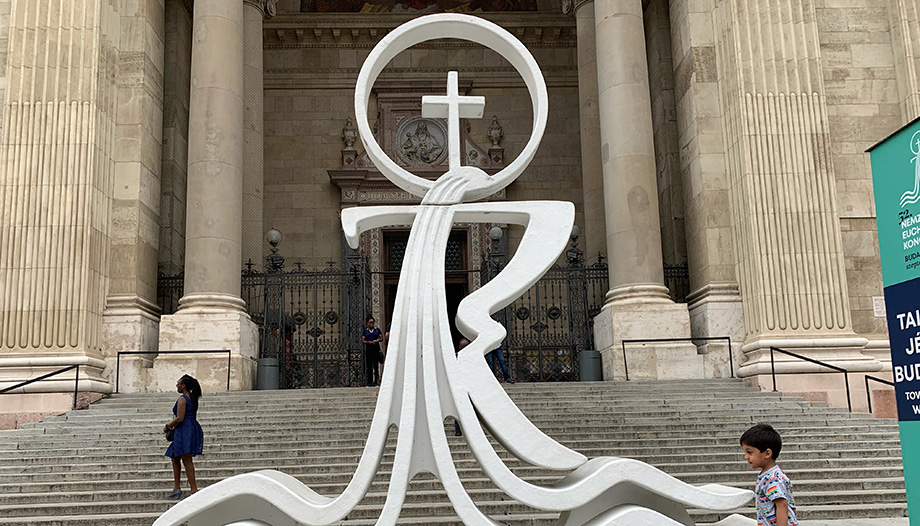The 52nd Eucharistic World Congress in the Hungarian capital of Budapest began on Sunday - with an initial community of 1,200 children. However, the main highlight of the event will be the opening ceremony with Papst Franziskus on the main Budapest Heldenplatz on Sunday morning. It will be remembered as a "statio orbis" - in other words, it is based on the cold-Christian tradition of the "statio urbis", when a city's streets celebrate a unique festival, in which all the glories of the city are reflected. In the Ereignis am Sonntag, this union of the Gläubigen with the Heiligen Vater on the church itself is to be celebrated.
Papst Franziskus is in Budapest for a visit of several hours, before he continues to visit the Slowakei on the same day for a longer period of time.
The Catholic Church in Ungarn was very successful in the Congress, which was supposed to take place as early as September 2020, but because of the Crown-Pandemie was closed. It is not at all possible to be able to celebrate in a relatively heavily populated country such as Hungary a large-scale celebration, which also promotes the faith of non-Catholics and non-Christians. If even a Pope comes to visit, the faith is even more secure.
The Catholic Bischofskonferenz has therefore been able to avoid a confrontation of the Eucharistic Congress through political issues - which in the past did not quite succeed, however. In early June, the US Catholic Register's US Catholic Portal reported that the Pope did not want the representatives of the Hungarian state, in particular Minister-President Viktor Orbán, to meet. The Polish media will soon follow suit: The reason for this is Orbán's restrictive migration policy, which is not even in line with the Papal line. This was also the reason that Franziskus would only have to spend a few hours in Hungary, was speculated.
These news reports contain a wide range of accurate and open Papstkritik from a number of commentators, which the Hungarian government's Fidesz party is holding. Finally, the Bischofskonferenz must itself be considered and officially emphasize that a meeting of the Papists with the highest representatives of the Hungarian state is planned on a "self-evident" basis. The meeting of the Heiligen Vaters with Orbán and State President János Áder should now take place in the background of the Heiligen Messe in the Museum der Schönen Künste.
The Fidesz government party, in which Orbán is a member, has been governed since 2010 with a two-thirds majority in the country. Some of the parties' companies and enterprises dominate various areas of public life, the economy, culture and the media. The right-wing nationalist party has a worldwide conservative outlook and is very conservative in its approach. Orbán, who himself is a member of the reformed (Calvinist) Church, is always interested in Catholic institutions and liturgies and is committed to his Christian beliefs in the openness of the Church. First of all, he was briefly arrested in Rome during a meeting of Catholic parliamentarians. However, in migration policy, he has again and again been subjected to severe criticism of the Pope's line - not by the government itself, but by his own people.
The media speculation about the relationship between the Vatican and the Hungarian state should not be allowed to change the credibility of the Congress and the papal cases, as the organizers would like to see. For this reason, one thing has been mentioned: Twenty-five prominent personalities from culture and science have been given the opportunity to show their appreciation for their creations during the presentations as "winners". At the beginning of the Papal Mass on the Budapester Heldenplatz there is a twofold concert, in which the musicians will perform their devotion to Jesus Christ. The missionary missionary cross, which was originally planned for the 2007 mission, was decorated with a cross-shaped cross and several relics of Hungarian pilgrims and self-sacrificing people and brought to the country.
The hymn of the congress has a special significance: it indicates that Budapest has already hosted a World Eucharistic Congress in 1938. It was decided to use the damned hymn, if not with modern orchestration. In May 1938, however, there was no visit by a former Pope in the Hungarian capital, as the Cardinal of the Vatican, Eugenio Pacelli - the later Pope Pius XII - spoke of. - the opening remarks. In recent years, he has become a "bullfighter" against communism and national socialism in Hungary.A few years before the Second World War, this radical radical change of attitude was clearly overshadowed by political conflicts: Adolf Hitler hatte kurzerhand ein Sondervisum für alle Deutschen eingeführt, die in der Zeit des Kongresses nach Ungarn reisen wollten, um die Teilnahme deutscher Katholiken an der Feier zu verhindern. Since only two months before the Kongress meeting the Austrian "Anschluss" to Germany was held, this also applies to the Austrian Catholics, who have been heavily represented in large numbers. In the end, however, 50,000 international visitors still made their way to Budapest, and many hundreds of thousands of people were sent to the celebrations after the celebrations. More than 75,000 people have already registered for the current Papal event, and many more groups will be formed.









